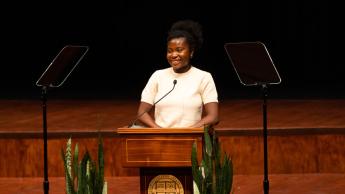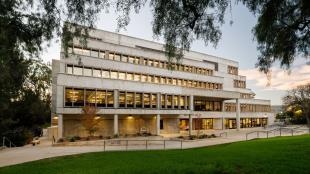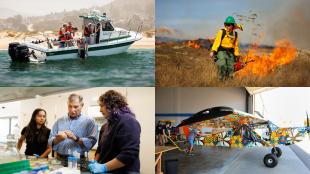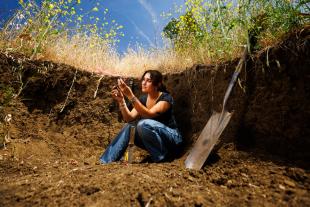Being In the Room: Meet New ASI President Gracie Babatola

This fall, third-year Gracie Babatola began her term as president of Associated Students Inc. Babatola, from Santa Cruz, California, is majoring in political science and minoring in ethics, public policy, science and technology. In her election campaign last spring, Babatola ran on a platform of “rebuilding connections.” As the new school year began, she spoke with Cal Poly News about her goals for the coming year, and what it means to serve others.
What inspired you to run for ASI president?
I've always just loved being in a room where decisions were being made. In high school, I was heavily involved in student government. But what really motivated me to run was I felt that there was a disconnection between students and ASI. COVID had really taken a toll in student government, but I felt that I perhaps had a fresh perspective that could be brought into student government.
Your campaign was all about rebuilding connections. What does that mean to you? What will that look like during your time as president and how will it impact students?
Rebuilding connections starts off with having students understand what ASI and what student government really is. I often meet students who obviously understand the general idea of student government, but they don't see the particular ways ASI has benefited them.
So it starts off with letting them know the good work that is being done by students and by professional staff, and then acknowledging where we need to do more. For example, making sure student clubs and organizations know we are a resource for them, and then saying, “Okay, what are some problems that you're noticing and how can we come together to fix this issue?”
What other specific goals do you want to accomplish as ASI president?
The majority of both incoming students and continuing students have had to endure some sort of online modality due to the pandemic. I want to help students get back to that in-person comfort level from before COVID.
I want to help students address basic needs. I think as the cost of living has gone up, we have noticed that a lot of our peers are struggling to pay for gas or to have affordable fresh produce. I'm looking for ways we can make students' lives easier. We are going to start hosting regular clothing swaps, encouraging a circular economy on campus and encouraging students to support more sustainable options when looking for clothing.
What do you think is the full potential for student government at Cal Poly? How much can student leaders like you shape the campus experience for fellow students?
In my brief time working with university administration, I've really seen how much they value student input. I don't think there's necessarily a limit. There are obviously processes and ways we go about things depending on the issue at hand. But I have found if there's an issue that is affecting students, the administration is always willing to work with student government to find a solution.
Tell me about the experience of running for president. What was the campaign experience like? What did you learn?
I got together with my campaign manager, Chloe Wardrick, months ahead of time to figure out why I wanted to run. She sat me down, making sure I was running for the right reasons, and that I would be actually capable of this position. I also met with Tess Loarie, the former ASI president, to understand what the role really is. And from there we built a spreadsheet of the steps of the whole campaign. It really took a lot of teamwork and effort, and the way I ran my campaign is the vision I want for student government — that it takes a whole lot of people to make something happen.
What are your career goals? And how does what you're doing now fit into what you want to do after you graduate?
During this campaign I discovered that I really do not want to go the route of election politics. The process of campaigning and the election itself was draining. I much prefer to just be in the room actually making policy.
I want to go to law school and become a public defender. I'm hoping that my role in student government will improve both on my communication skills and my network. In political science there's often two main routes for graduates to go: law or elected office. This position has helped me see other ways I can help people outside of politics.
Public defender is a challenging role. What draws you to that specific form of law?
It’s something I’ve wanted since I was nine years old. I feel like it's a calling for me. In our pre-law courses, we’re made very aware of the issues within our criminal justice system. But I wouldn’t feel that I am working to my fullest potential if I'm not serving in a capacity that can improve things for others.
Photo above: Babatola addresses an audience of staff and faculty members at Cal Poly's opening convocation in September. Photo by Joe Johnston.
Want more Learn by Doing stories in your life? Sign up for our monthly newsletter, the Cal Poly News Recap!




